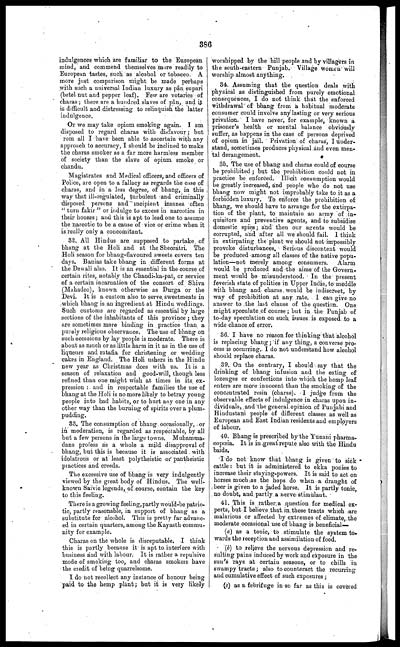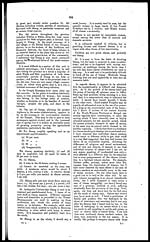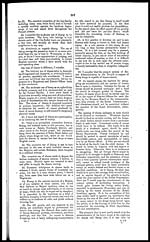Medicine - Drugs > Report of the Indian Hemp Drugs Commission, 1894-1895 > Volume V
(406) Page 386
Download files
Individual page:
Thumbnail gallery: Grid view | List view

386
indulgences which are familiar to the European
mind, and commend themselves more readily to
European tastes, such as alcohol or tobacco. A
more just comparison might be made perhaps
with such a universal Indian luxury as pân supari
(betel nut and pepper leaf). Few are votaries of
charas; there are a hundred slaves of pân, and it
is difficult and distressing to relinquish the latter
indulgence.
Or we may take opium smoking again. I am
disposed to regard charas with disfavour; hut
rom all I have been able to ascertain with any
approach to accuracy, I should be inclined to make
the charas smoker as a far more harmless member
of society than the slave of opium smoke or
chandu.
Magistrates and Medical officers, and officers of
Police, are open to a fallacy as regards the case of
charas, and in a less degree, of bhang, in this
way that ill-regulated, turbulent and criminally
disposed persons and incipient insanes often
"turn fakir" or indulge to excess in narcotics in
their houses; and this is apt to lead one to assume
the narcotic to be a cause of vice or crime when it
is really only a concomitant.
32. All Hindus are supposed to partake of
bhang at the Holi and at the Sheoratri. The
Holi season for bhang-flavoured sweets covers ten
days. Banias take bhang in different forms at
the Dewali also. It is an essential in the course of
certain rites, notably the Chandi-ka-pat, or service
of a certain incarnation of the consort of Shiva
(Mahadeo), known otherwise as Durga or the
Devi. It is a custom also to serve sweetmeats in
which bhang is an ingredient at Hindu weddings.
Such customs are regarded as essential by large
sections of the inhabitants of this province; they
are sometimes more binding in practice than a
purely religious observance. The use of bhang on
such occasions by lay people is moderate. There is
about as much or as little harm in it as in the use of
liqueurs and ratafia for christening or wedding
cakes in England. The Holi ushers in the Hindu
new year as Christmas does with us. It is a
season of relaxation and good-will, though less
refined than one might wish at times in its ex-
pression: and in respectable families the use of
bhang at the Holi is no more likely to betray young
people into bad habits, or to hurt any one in any
other way than the burning of spirits over a plum-
pudding.
83. The consumption of bhang occasionally, or
in moderation, is regarded as respectable, by all
but a few persons in the large towns. Muhamma-
dans profess as a whole a mild disapproval of
bhang, but this is because it is associated with
idolatrous or at least polytheistic or pantheistic
practices and creeds.
The excessive use of bhang is very indulgently
viewed by the great body of Hindus. The well-
known Saivic legends, of course, contain the key
to this feeling.
There is a growing feeling, partly would-be patrio-
tic, partly reasonable, in support of bhang as a
substitute for alcohol. This is pretty far advanc-
ed in certain quarters, among the Kayasth commu-
nity for example.
Charas on the whole is disreputable. I think
this is partly because it is apt to interfere with
business and with labour. It is rather a repulsive
mode of smoking too, and charas smokers have
the credit of being quarrelsome.
I do not recollect any instance of honour being
paid to the hemp plant; but it is very likely
worshipped by the hill people and by villagers in
the south-eastern Punjab. Village women will
worship almost anything.
34. Assuming that the question deals with
physical as distinguished from purely emotional
consequences, I do not think that the enforced
withdrawal of bhang from a habitual moderate
consumer could involve any lasting or very serious
privation. I have never, for example, known a
prisoner's health or mental balance obviously
suffer, as happens in the case of persons deprived
of opium in jail. Privation of chains, I under-
stand, sometimes produces physical and even men-
tal derangement.
35. The use of bhang and charas could of course
be prohibited; but the prohibition could not in
practice be enforced. Illicit consumption would
be greatly increased, and people who do not use
bhang now might not improbably take to it as a
forbidden luxury. To enforce the prohibition of
bhang, we should have to arrange for the extirpa-
tion of the plant, to maintain an army of in-
quisitors and preventive agents, and to subsidise
domestic spies; and then our agents would be
corrupted, and after all we should fail. 1 think
in extirpating the plant we should not impossibly
provoke disturbances. Serious discontent would
be produced among all classes of the native popu-
lation—not merely among consumers. Alarm
would be produced and the aims of the Govern-
ment would bo misunderstood. In the present
feverish state of politics in Upper India, to meddle
with bhang and charas would be indiscreet, by
way of prohibition at any rate. I can give no
answer to the last clause of the question. One
might speculate of course; but in the Punjab of
to-day speculation on such issues is exposed to a
wide chance of error.
36. I have no reason for thinking that alcohol
is replacing bhang; if any thing, a converse pro-
cess is occurring. I do not understand how alcohol
should replace charas.
39. On the contrary, I should say that the
drinking of bhang infusion and the eating of
lozenges or confections into which the hemp leaf
enters are more innocent than the smoking of the
concentrated resin (charas). I judge from the
observable effects of indulgence in charas upon in-
dividuals, and the general opinion of Punjabi and
Hindustani people of different classes as well as
European and East Indian residents and employers
of labour.
40. Bhang is prescribed by the Yunani pharma-
copoeia. It is in great repute also with the Hindu
baids.
I do not know that bhang is given to sick
cattle: but it is administered to ekka ponies to
increase their staying-powers. It is said to act on
horses much as the hops do when a draught of
beer is given to a jaded horse. It is partly tonic,
no doubt, and partly a nerve stimulant.
41. This is rather a question for medical ex-
perts, but I believe that in these tracts which are
malarious or affected by extremes of climate, the
moderate occasional use of bhang is beneficial—
(a) as a tonic, to stimulate the system to-
wards the reception and assimilation of food.
(b) to relieve the nervous depression and re-
sulting pains induced by work and exposure in the
sun's rays at certain seasons, or to chills in
swampy tracts; also to counteract the recurring
and cumulative effect of such exposures;
(c) as a febrifuge in so far as this is covered
Set display mode to: Large image | Zoom image | Transcription
Images and transcriptions on this page, including medium image downloads, may be used under the Creative Commons Attribution 4.0 International Licence unless otherwise stated. ![]()
| India Papers > Medicine - Drugs > Report of the Indian Hemp Drugs Commission, 1894-1895 > Volume V > (406) Page 386 |
|---|
| Permanent URL | https://digital.nls.uk/75122049 |
|---|
| Description | Volume 5: Evidence of witnesses from North-Western Provinces and Oudh and Punjab. Answers from witnesses in North-Western Provinces, Oudh and Punjab about cultivation and growth of hemp, preparation or manufacture, trade, consumption or use, effects, administration - taxation and control. |
|---|---|
| Attribution and copyright: |
|




